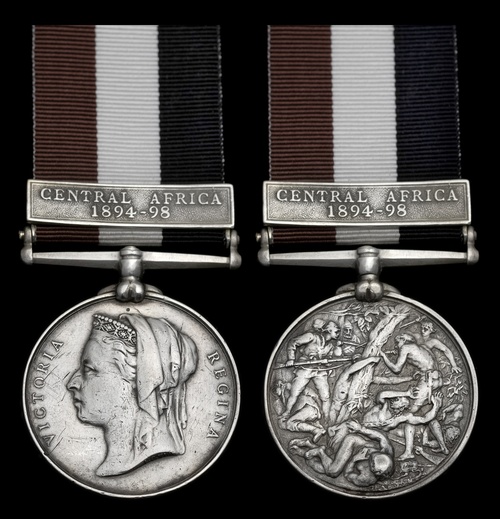
Auction: 24113 - Orders, Decorations and Medals - e-Auction
Lot: 148
Central Africa 1891-98, silver issue, 1 clasp, Central Africa 1894-98 (26 Pte Stambuli B.C.A. Rifles.), light contact marks, otherwise very fine
Stambuli is confirmed on the medal roll as 26 Private Stambuli and is shown as having earned his medal as part of B Company, B.C.A. Rifles, the roll noting his participation in the operations of “Chilwa 8. 97” “Mpezeni Jany Feby 98”. He additionally appears on the roll for the Africa General Service 1902-56 with clasp B.C.A. 1899-1900 as serving with B Company, 1st Battalion King's African Rifles being stationed at Zomba.
Chilwa August 1897
Lake Chilwa, or “Shirwa” as it is sometimes called was south-east of Nyasa on the Portuguese Border. The area to the north-west was under the control of the Yao Chief, Kawinga, circa 1895, who had had long been sullen towards British Rule in Central Africa. In 1895 he had launched a serious attack on the British nearby, raiding the territory of Malemia, with the aid of his nearby allies, the Anguru from the Portuguese territory to the east of Chilwa. The attack was a combined effort to remove the “Drive the white man from the country” but was repulsed by a small force of Sikhs and Atonga sent by a Mr. Sharpe. The cause of the Punitive Expedition that Private Stambuli took part in during August 1897, from The Handbook of Nyasaland:
“During 1897, the Anguru caused some trouble round about Lake Shirwa by Highway Robbery, and an expedition was despatched to deal with them in August of the year.”
Mpezeni Campaign
Chief Mpezeni of the Ngoni Tribe was a notable South African Chieftain, the son of the great Ngoni King Zwangendabe who had originally taken his “Jere” people on a monumental migration of over 1000 miles over 20 years from their home in Swaziland to what is now Tanzania, they would become one of the most powerful kingdoms of Eastern Africa. The kingdom was fragmented after the death of his father and Mpezeni led his people down south into the Luangwa Valley (Now Southern Zambia), where in the 1860's he would establish a new state based on the growing of grain, cattle keeping and slave raiding. He had formed friendly relations with the Portuguese Traders, but in the 1890s his power became a target for the British South Africa Company.
In an attempt to prevent a British takeover, Mpezeni granted a huge mineral and land concession to the German adventurer Karl Wiese. Soon afterwards, however, Wiese then sold his concession to a London based company that would become the North Charterland Company, a subsidiary of the BSAC. In response to the Englishmen now poking around his land prospecting for gold, Mpezeni’s son Nsingu launched an attack with his warriors, against the wishes of his father, leading to the death of two Europeans. The BSAC were not pleased and swiftly launched a strong attack on Mpezeni and his state, forcing him to surrender by February 1898, and in retaliation killed his son.
Some further information on the betrayal by Karl Wiese from the Historical Dictionary of Malawi:
'Wiese Karl, German Adventurer, Trader and one of the creators of the Norther Charterland Exploration Company:
Karl Wiese arrived in the Mozambique section of Luangwa Valley in the 1880s. Married to a Tete slave trader, he like many Portuguese of the time, had many Chikunda who formed his retinue of security men and commercial assistants. In 1885, he settled in Mpezeni’s area and, within 5 years, he was falsely claiming to have signed treaties with Mpezeni, who was known to be against such agreements. When Harry Johnston, Alfred Sharpe and the British government refused to believe him, he began to publicise statements about the existence of large deposits of gold in the region. This attracted the attention of some London businessmen and of Cecil Rhodes’s British South Africa Company, who together formed, in 1895, the North Charterland Exploration Company, to manage Wiese’s claims of concessions from Mpezeni, amounting to 10,000 square miles of Mpezeni’s domain. When he came to realise what had transpired, Mpezeni was disturbed but he called for calm. However his son Nsingu took action and in 1897 killed two Europeans, the rest including Wiese appealed for assistance, which duly came from the Blantyre based Central African Rifles, Nsingu was captured and killed.'
Subject to 20% VAT on Buyer’s Premium. For more information please view Terms and Conditions for Buyers.
Sold for
£1,300
Starting price
£550




